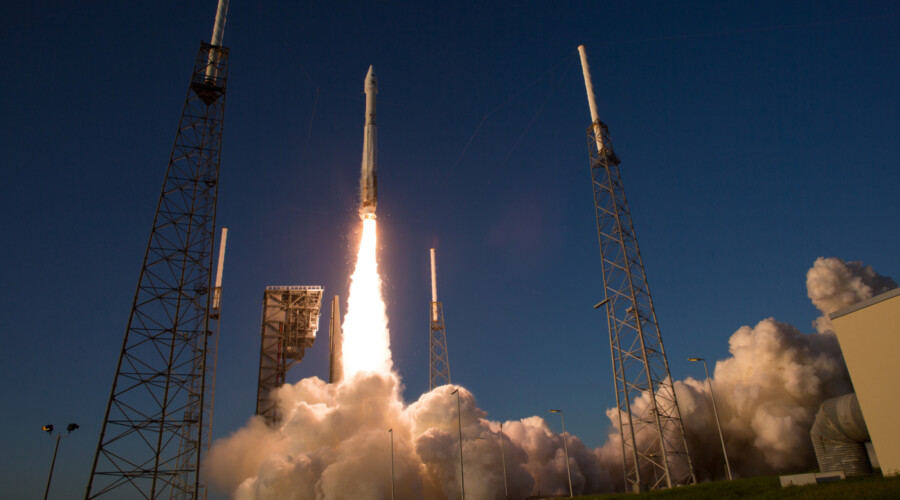During last December’s National Space Council meeting, Phil Gordon, national security adviser to Vice President Kamala Harris, instructed the director of National Intelligence to develop a national proposal on the minimum cybersecurity standards for securing space systems. While this is a welcome development, the Biden administration should also consider a second line of effort to empower NASA and the Department of State to lead an effort working with the Artemis Accords Coalition to craft an international proposal on cybersecurity best practices for space systems. Specifically, the administration should focus on developing mission security and design principles for protecting both the space vehicle and the ground segment from cyber threats. The Artemis space exploration program, which aims to return humans to the to the lunar South pole in September 2026 and support the first crewed mission to Mars, among other missions, could help bring multi-stakeholders together in another related way—advancing cybersecurity best practices for space systems.
The Artemis Accords and Space Exploration Program
To date, 36 nations have pledged to support the Artemis Accords, a multilateral, non-binding voluntary framework composed of nine principles created to promote the peaceful and sustainable exploration of outer space. These states have also endorsed the Artemis space exploration program, which was established in October 2020, with coalition partners from Australia, Canada, Italy, Japan, Luxembourg, the United Arab Emirates, the United Kingdom, and the United States. Uruguay is the most recent signatory as of February 15, 2024. During the formal signing ceremony between Uruguay and U.S. representatives at NASA headquarters, State Department officials echoed the Biden administration’s call for broadening international space partnerships and facilitating information sharing to promote security.
Apart from the Accords, the space exploration program’s first crewed mission around the Moon, Artemis II, is slated for September 2025. This four-person crewed mission is anticipated to orbit the Moon in approximately ten days.
As part of this program, the Artemis Accords Coalition could also help shape the discussion around reducing cyber vulnerabilities to space systems and infrastructure. Perhaps this could take the form of developing a working group within Artemis to produce a global best practices guide for securing space systems from potential cyber threats and vulnerabilities. The International Committee on Global Navigation Satellite Systems (ICG), organized under the UN, could also serve as a focal point for exchanges related to developing a global best practices guide for Global Navigation Satellite Systems (GNSS).
Last fall in Madrid, Spain, the committee convened its 17th annual meeting with GNSS representatives of core service providers to discuss the ICG’s terms of reference for promoting the use and application of GNSS globally. Drawing from these various expert communities, there is potential to boost global cooperation around cybersecurity hygiene principles for space systems, mitigate unauthorized access to critical space system functions, and manage supply chain risks. To this point, the United States Department of State’s Strategic Framework for Space Diplomacy recognizes the increasing interdependence between cyber and space threats, and encourages strategic collaboration across multiple sectors. The State Department also regards the Artemis Accords as a “centerpiece of the United States’ civil space diplomacy,” to promote a rules-based international order.
Generating Discussions in Multilateral Fora
Convening an international working group around these issues under the aegis of Artemis could also generate deeper global dialogues in other multilateral fora, like the United Nations Committee for the Peaceful Uses of Outer Space (UN COPUOS), around dual capacity building in cyber and space. Efforts to enhance security and reliability in space operations benefit NASA, international partners, and others working in space exploration and development. These benefits include expanding integration with allies and partners to increase information sharing, enhancing the resiliency of systems, and promoting space sustainability of space activities.
Sustainability in this domain is generally understood as referring to maintaining the ability to operate in space in the future, and “in a manner that realizes the objectives of equitable access to the benefits of the exploration and use of outer space for peaceful purposes,” based on the 2019 Guidelines for the Long-term Sustainability of Outer Space of UN COPUOS. Surprisingly, these guidelines do not mention cybersecurity, which is an essential component for supporting the engineering lifecycle of developing sustainable, secure, and resilient space systems. Herein lies a capacity-building opportunity for identifying best practices for safeguarding space assets and their supporting infrastructure from cyber threats. According to White House National Security Advisor Jake Sullivan, international cooperation will become “even more important as both the opportunities in space evolve and the threats, in and to space, evolve as well.”
As these threats evolve, so too can the opportunities for security collaboration. In summary, the Artemis Accords Coalition, along with the work of the ICG and UN COPUOS, could serve as a major convenor to support cyber capacity building in space missions. Enhanced collaboration across sectors and domains is critical to detecting and responding to cyber threats to space systems.
Carnegie Council for Ethics in International Affairs is an independent and nonpartisan nonprofit. The views expressed within this article are those of the author and do not necessarily reflect the position of Carnegie Council.




